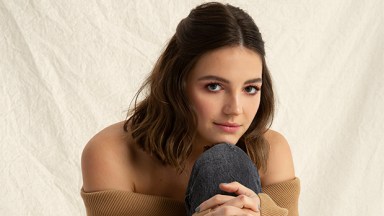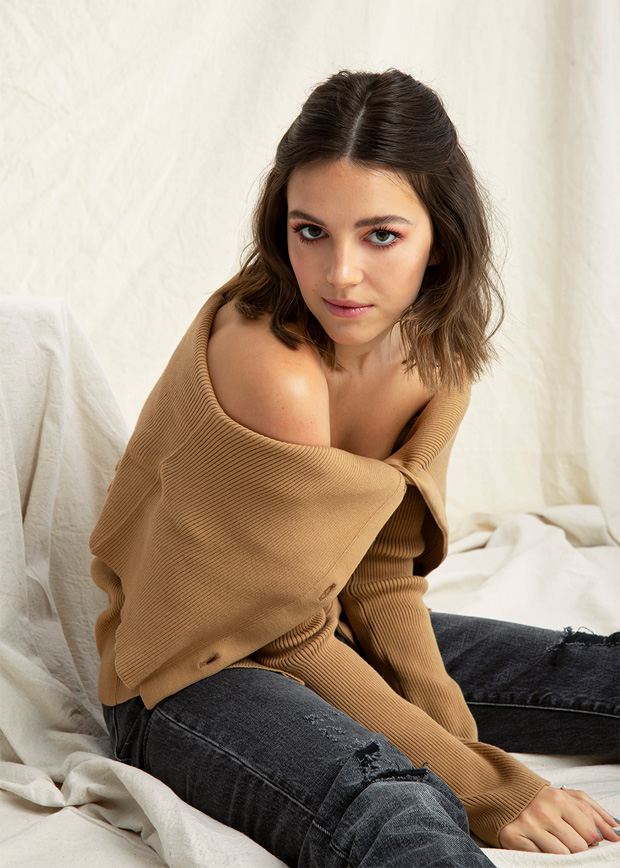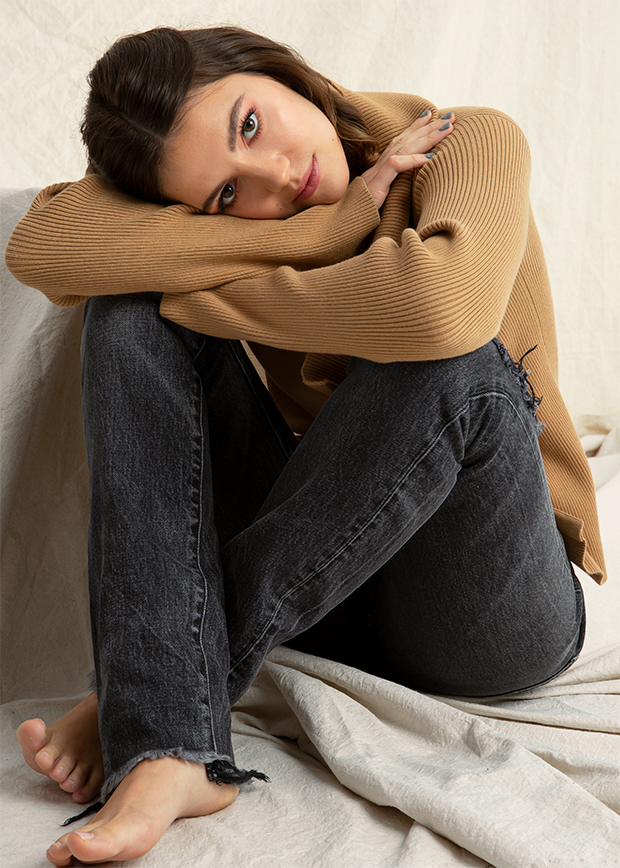
Dickinson is about to be your new favorite show, without a doubt. Ella Hunt stars in the Apple TV+ series as Sue Gilbert, Emily Dickinson’s best friend. Their friendship is at the center of the show, as well as their love story. Dickinson is anything but a typical TV show. Although the series is set in the 19th century, Dickinson is putting a modern spin on Emily Dickinson’s story. Millennials, prepare to be obsessed.
Ella is just as excited as the rest of us to see this show finally debut. HollywoodLife sat down EXCLUSIVELY with the actress to get the scoop before the show’s Nov. 1 premiere. Ella said that she was “blown away” by creator Alena Smith’s concept for the show and loved exploring the inner workings of Sue Gilbert. While Emily is larger than life, Ella admitted that it’s “all about what’s brewing under the surface with Sue.” Ella also noted that she was “enchanted” by the way Sue and Emily’s relationship was explored. It wasn’t just about sex. Dickinson really shows the “discovery of intimacy” between them.
When you got the role, how much research did you do into Sue?
Ella Hunt: There is quite an extensive amount online about Sue because she was so close to Emily and they lived next door. I did a lot of research into female friendships in the 1800s. That was really important for me to research and learn about because I think Sue’s relationship [with Emily] is this affectionate friendship and love story. It was really fascinating researching about it. Women during that time were actively encouraged to form almost romantic bonds with their friends, and they’d send each other tokens and long letters of love and it’s quite special looking at relationships between women in those times because they were sort of bonded by how hard life was. Because they were functioning in these entrapment devices basically, their corsets and their skirts, and having to cook and clean all day long. I mean, going to fetch water was not a small task. It was an all-day thing. So I did a lot of research into the historical, social context of the time we were shooting in. Probably more than researching Sue specifically because I wanted to trust what Alena had written for Sue. Alena also has such an encyclopedic knowledge of Emily Dickinson. If I had a question, I’d just go to Alena.
There’s a big difference between Emily and Sue. Emily has a huge family, whereas Sue has lost everything. What was it like for you to explore loneliness in Sue?
Ella Hunt: It was interesting playing someone who, by necessity, is pragmatic. She is the polar opposite to Emily in that one way. In every other way, they are so close, but Sue has to be pragmatic because she has nothing to fall back on. When we meet her, she really is confronting being destitute. That was a huge plight for women if they didn’t find a husband. So Sue knows that she has to marry well. Emily just doesn’t have that restraint. But it was also a challenge playing someone who’s been through so much loss because I think when you’ve been through so much, you don’t know how to feel really. So a lot of it was being okay with silence. The joke on the set was Sue has a talent for silence and actually not overplaying the emotion, not being melodramatic, but just being quite sturdily sad. It’s all about what’s brewing under the surface with Sue.
What do you love most about Sue and Emily’s bond?
Ella Hunt: It’s so special. I was really enchanted by how similar it is to friendships these days. They’re bonding over all of the same things that girls today bond over, like a need for intellectual stimulation and to be seen as equals to men. I also thought what was so special about their friendship is that Sue is sort of darkness personified when we meet her, and Emily is the lightness to Sue’s darkness. Emily encourages Sue to live and I think is really the thing that’s keeping Sue alive in a lot of ways. She’s completely alone in the world. Sue is like a refugee in some sense where she’s completely displaced by losing her family, and the Dickinsons, all of them, take her in and love her in different ways. Sometimes it’s a bit overwhelming for her.
In the romantic aspect, what was it like to explore Sue and Emily’s beautiful connection?
Ella Hunt: It’s a really special story. I loved researching and reading Emily’s letters to Sue. I think when I got on set to shoot the intimate stuff, what I was so surprised by was our first director David Gordon Green and his delicacy around it. He wasn’t trying to tell a story about sexuality. He was trying to tell the story about intimacy and the discovery of intimacy. I think that’s so important to be telling on screen. I’m so excited for young women and men to watch this. Because he wanted to do shots of our feet touching and our hands, and I just think it’s so much more special than it being about sex.
Sue does end up marrying Austin, Emily’s brother. What kind of complications does that provide for Sue and Emily?
Ella Hunt: I mean, their relationship from beginning to finish was a complicated one. It was not whole plain sailing, and historically, they had parts of their life where they were almost feuding. But through it all there was just this deep connection. Whatever they were going through, whether it’s in our show or in real life, there is just this bond that keeps them from losing track of each other. But it certainly complicates things.
It’s an unconventional triangle.
Ella Hunt: It’s a very unconventional triangle. I think I enjoyed exploring what Austin was for Sue as well. He was stability and loyalty. As the show progresses, that’s a really lovely storyline, too. Sue has all of these fears that it takes her quite a while to voice, and eventually, Austin becomes a place where she is able to share those.
I love the show and the way that it incorporates modern phrases and just little things that make it so relatable to today’s audiences.
Ella Hunt: I was so excited to be part of something that was discussing the issues we struggle with today by rediscovering the past and rediscovering a woman who was so misunderstood in her own time and choosing a period of her life that isn’t so well discussed. Just right from the minute I read Alena’s first script. I was so blown away by her concept, how unique it was, and I felt so excited to share it with people.


What do you want viewers to take away from this show?
Ella Hunt: I hope that any person watching the show who feels like they have something to say, whether it’s creatively or in any kind of field, feels like they are able to go out and do it. Because our show really is about not putting people in a box and saying, look, there was this woman whose family, society, and gender all meant that she wasn’t supposed to do this thing and she still f**king did it. What I love about Alena’s writing is, she gives everyone space to develop and grow. There isn’t one storyline that’s underlooked. There are moments for all of us. I even feel for Jane [Krakowski]’s character by the end of the season. You have a real perspective and understanding of this woman, and it’s tragic and beautiful. Although she’s a character at the beginning of the show that you go, oh, this is a comedy character, by the end it feels so profound.
Emily and Sue’s relationship is at the center of the show. What was it like collaborating with Hailee Steinfeld and forming that really close bond?
Ella Hunt: Hailee is a spectacular actress and person. Right from the start of shooting, she was so open to collaborating and letting things flow and grow and develop. It’s funny, I had one perspective of Sue and Emily’s relationship when we started finishing, and then by the end of the shooting, I had just this new respect for their story. It was so fun to get to grow that with Hailee.


